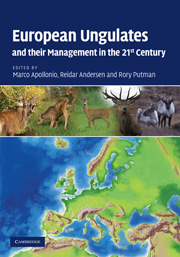European Ungulates and their Management in the 21st Century
Langue : Anglais
Coordonnateurs : Apollonio Marco, Andersen Reidar, Putman Rory

The first book to summarise management objectives for ungulates across Europe.
This book is the first to explore the diversity of management objectives and the different approaches to wildlife management of large ungulates in a wide range of different European countries. Specialist authors from each country present an analysis of the species present, numerical status and distribution of different ungulates which occur in their particular country and consider issues which must be addressed by management (whether management for conservation, for control of damaging impacts or for exploitation). Management systems are described (and both legislative and administrative structures) together with an evaluation of how effective current management practices may be in addressing problems identified - or the extent to which they may contribute to those problems. The book is aimed primarily at those who may be actively involved in research into improving methods of wildlife management; practising wildlife managers and game-keepers; policy makers in local regional or national administrations, responsible for formulating policies.
Introduction M. Apollonio, R. Anderson and R. Putman; 1. Norway R. Andersen, E. Lund, E. Johan Solberg and B.-E. Sæther; 2. Sweden O. Liberg, R. Bergström, J. Kindberg and H. von Essen; 3. Finland V. Ruusila and I. Kojola; 4. Baltic Countries Z. Andersone-Lilley, L. Balčiauskas, J. Ozoliņš, T. Randveer and J. Tõnisson; 5. Denmark R. Andersen and V. Holthe; 6. Germany U. Wotschikowsky; 7. Poland P. Wawrzyniak, W. Jędrzejewski, B. Jędrzejewska and T. Borowik; 8. Czech Republic L. Bartoš, R. Kotrba and J. Pintíř; 9. Slovakia S. Finďo and M. Skuban; 10. Great Britain R. Putman; 11. The Netherlands S. van Wieren and G. Groot Bruinderink; 12. Belgium J. Casaer and A. Licoppe; 13. Switzerland N. Imesch-Bebié, H. Gander and R. Schnidrig-Petrig; 14. Austria F. Reimoser and S. Reimoser; 15. Hungary S. Csányi; 16. Romania I. Micu, A. Náhlik, Ş. Neguş, I. Mihalache and I. Szabó; 17. Portugal J. Vingada, C. Fonseca, J. Cancela, J. Ferreira and C. Eira; 18. Spain J. Carranza; 19. France D. Maillard, J. Gaillard, M. Hewison, P. Ballon, P. Duncan, A. Loison, C. Toïgo, E. Baubet, C. Bonenfant, M. Garel and C. Saint-Andrieux; 20. Italy M. Apollonio, S. Ciuti, L. Pedrotti and P. Banti; 21. Slovenia M. Adamic and K. Jerina; 22. Croatia J. Kusak and K. Krapinec; 23. Greece H. Papaioannou; 24. Present status and future challenges for European ungulate management M. Apollonio, R. Anderson and R. Putman; Index.
Marco Apollonio is full professor at the University of Sassari where he is presently director of the department of Zoology and of the PhD School in Natural Science. His main interests are in ungulate behaviour, ecology and genetics, with specific focus on mating and social behaviour and on predator-prey relationships involving wolves and ungulates. He is president of the Italian Mammalogical Society and was involved in conservation activities as CITES scientific commission member for Italy and as member of the board of directors of two national parks in the last 15 years.
Reidar Andersen is a professor in Conservation Biology at the Museum of Natural History and Archaeology at the Norwegian University of Science and Technology. He has been leading several cross-disciplinary research projects focusing on ungulates and large carnivores, always aiming at producing applied knowledge securing a sustainable management of the involved species. In the last years he has been focusing on non-native invasive species.
Rory Putman is a freelance environmental consultant and wildlife adviser, based in Scotland, and also holds an Emeritus Chair at Manchester Metropolitan University. He has worked widely in the UK and overseas, with research efforts focused on the population ecology of different ungulate species and their interaction with their vegetational environment – always with the explicit aim of using increased understanding to help develop more sensitive and more effective methods of managing those same ungulate populations and their impacts on agriculture, forestry or conservation interests.
Reidar Andersen is a professor in Conservation Biology at the Museum of Natural History and Archaeology at the Norwegian University of Science and Technology. He has been leading several cross-disciplinary research projects focusing on ungulates and large carnivores, always aiming at producing applied knowledge securing a sustainable management of the involved species. In the last years he has been focusing on non-native invasive species.
Rory Putman is a freelance environmental consultant and wildlife adviser, based in Scotland, and also holds an Emeritus Chair at Manchester Metropolitan University. He has worked widely in the UK and overseas, with research efforts focused on the population ecology of different ungulate species and their interaction with their vegetational environment – always with the explicit aim of using increased understanding to help develop more sensitive and more effective methods of managing those same ungulate populations and their impacts on agriculture, forestry or conservation interests.
Date de parution : 02-2010
Ouvrage de 618 p.
18.3x25.5 cm
Disponible chez l'éditeur (délai d'approvisionnement : 14 jours).
Prix indicatif 179,62 €
Ajouter au panier
© 2024 LAVOISIER S.A.S.



